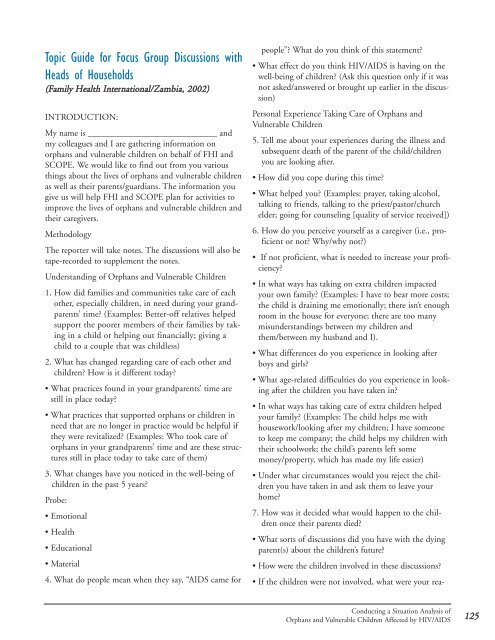Conducting a Participatory Situation Analysis of.pdf - Global HIV ...
Conducting a Participatory Situation Analysis of.pdf - Global HIV ...
Conducting a Participatory Situation Analysis of.pdf - Global HIV ...
You also want an ePaper? Increase the reach of your titles
YUMPU automatically turns print PDFs into web optimized ePapers that Google loves.
Topic Guide for Focus Group Discussions with<br />
Heads <strong>of</strong> Households<br />
(Family Health International/Zambia, 2002)<br />
INTRODUCTION:<br />
My name is _____________________________ and<br />
my colleagues and I are gathering information on<br />
orphans and vulnerable children on behalf <strong>of</strong> FHI and<br />
SCOPE. We would like to find out from you various<br />
things about the lives <strong>of</strong> orphans and vulnerable children<br />
as well as their parents/guardians. The information you<br />
give us will help FHI and SCOPE plan for activities to<br />
improve the lives <strong>of</strong> orphans and vulnerable children and<br />
their caregivers.<br />
Methodology<br />
The reporter will take notes. The discussions will also be<br />
tape-recorded to supplement the notes.<br />
Understanding <strong>of</strong> Orphans and Vulnerable Children<br />
1. How did families and communities take care <strong>of</strong> each<br />
other, especially children, in need during your grandparents’<br />
time? (Examples: Better-<strong>of</strong>f relatives helped<br />
support the poorer members <strong>of</strong> their families by taking<br />
in a child or helping out financially; giving a<br />
child to a couple that was childless)<br />
2. What has changed regarding care <strong>of</strong> each other and<br />
children? How is it different today?<br />
• What practices found in your grandparents’ time are<br />
still in place today?<br />
• What practices that supported orphans or children in<br />
need that are no longer in practice would be helpful if<br />
they were revitalized? (Examples: Who took care <strong>of</strong><br />
orphans in your grandparents’ time and are these structures<br />
still in place today to take care <strong>of</strong> them)<br />
3. What changes have you noticed in the well-being <strong>of</strong><br />
children in the past 5 years?<br />
Probe:<br />
• Emotional<br />
• Health<br />
• Educational<br />
• Material<br />
4. What do people mean when they say, “AIDS came for<br />
people”? What do you think <strong>of</strong> this statement?<br />
• What effect do you think <strong>HIV</strong>/AIDS is having on the<br />
well-being <strong>of</strong> children? (Ask this question only if it was<br />
not asked/answered or brought up earlier in the discussion)<br />
Personal Experience Taking Care <strong>of</strong> Orphans and<br />
Vulnerable Children<br />
5. Tell me about your experiences during the illness and<br />
subsequent death <strong>of</strong> the parent <strong>of</strong> the child/children<br />
you are looking after.<br />
• How did you cope during this time?<br />
• What helped you? (Examples: prayer, taking alcohol,<br />
talking to friends, talking to the priest/pastor/church<br />
elder; going for counseling [quality <strong>of</strong> service received])<br />
6. How do you perceive yourself as a caregiver (i.e., pr<strong>of</strong>icient<br />
or not? Why/why not?)<br />
• If not pr<strong>of</strong>icient, what is needed to increase your pr<strong>of</strong>iciency?<br />
• In what ways has taking on extra children impacted<br />
your own family? (Examples: I have to bear more costs;<br />
the child is draining me emotionally; there isn’t enough<br />
room in the house for everyone; there are too many<br />
misunderstandings between my children and<br />
them/between my husband and I).<br />
• What differences do you experience in looking after<br />
boys and girls?<br />
• What age-related difficulties do you experience in looking<br />
after the children you have taken in?<br />
• In what ways has taking care <strong>of</strong> extra children helped<br />
your family? (Examples: The child helps me with<br />
housework/looking after my children; I have someone<br />
to keep me company; the child helps my children with<br />
their schoolwork; the child’s parents left some<br />
money/property, which has made my life easier)<br />
• Under what circumstances would you reject the children<br />
you have taken in and ask them to leave your<br />
home?<br />
7. How was it decided what would happen to the children<br />
once their parents died?<br />
• What sorts <strong>of</strong> discussions did you have with the dying<br />
parent(s) about the children’s future?<br />
• How were the children involved in these discussions?<br />
• If the children were not involved, what were your rea-<br />
<strong>Conducting</strong> a <strong>Situation</strong> <strong>Analysis</strong> <strong>of</strong><br />
Orphans and Vulnerable Children Affected by <strong>HIV</strong>/AIDS<br />
125















